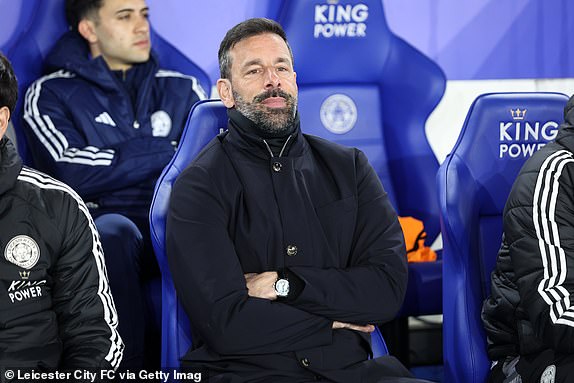With Wolves now holding a nine-point lead over Leicester City and relegation all but certain, it’s time to shift focus to the future. The solution to Leicester’s troubles might come from an unexpected source.
The harsh truth is that this squad is significantly weaker than the one previously relegated, making an immediate return to the Premier League a much tougher task this time around.
Some fans romanticize the Championship as a “happy place” where the team “wins most weeks,” but Luton’s struggles this season—fighting the possibility of consecutive relegations—should serve as a reality check for what might be ahead for Leicester.
The Situation So Far
Once relegation is confirmed, Leicester’s biggest challenge might not be on the pitch but in the boardroom, facing scrutiny from the EFL and its legal team. Even starting next season without complications isn’t guaranteed.
For those unaware, the club is likely to face EFL sanctions following relegation. To recap, Leicester exceeded FFP limits by roughly £30 million for the 2022/23 season—the same season they were relegated from the Premier League.
The reasons behind this financial breach have been widely discussed, with some losses being self-inflicted (poor signings on high wages) and others unavoidable (losing merit payments after finishing 18th, managerial changes, etc.). This is well-covered ground.
At the time, league regulations—since revised—meant that Leicester didn’t have to officially confirm this loss until March 2024. By then, the Premier League had charged the club with a breach, and the EFL attempted to follow suit.
However, Leicester appealed the Premier League’s charge on the basis that, by the time the accounting period closed, they were no longer a Premier League club. This legal maneuvering delayed any action, preventing the EFL from bringing their own charges.
The uncertainty around these legal battles cast a shadow over last summer, impacting the club’s ability to attract a high-caliber manager after Enzo Maresca’s departure and likely affecting transfer plans. Yet, the club remained confident in its position—enter Nick De Marco.
By September, Leicester successfully had the Premier League charges dismissed by shifting their accounting period, arguing that they had already surrendered their ‘Premier League share’ by the time the breach officially took place. This also meant the EFL couldn’t act, as Leicester was no longer under their jurisdiction at the time.
Since then, the Premier League has made some noise about revisiting the case, but nothing concrete has emerged. Leicester has endured a disastrous season, though without a points deduction further worsening their tally.
The EFL, however, is expected to take action the moment relegation is confirmed. They will likely claim Leicester still has outstanding charges from their previous Championship stint and will waste no time pursuing them.
What Happens Next?
At this stage, it’s all speculation, but Leicester will fight any charges with more determination than the players have shown on the pitch this season.
If the club is sanctioned, any punishment could impact the future—especially if it includes a points deduction, which would be disastrous.
But what if the penalty was a transfer embargo instead? Could that actually be beneficial?
Consider the potential effect on the manager. Ideally, it would force him to resign.
Ruud van Nistelrooy’s appointment has been nothing short of disastrous. If hiring him was meant to steady the ship, it’s been more like placing a sieve over a sinkhole—nothing has stopped the collapse.
From the beginning, his job was difficult, but even so, few figures in the club’s history have been as disappointing. His ideas seemed to run dry by halftime of his third match in charge against Newcastle, and since then, he has looked lost, his supposed aura fading while the team falls apart around him.
No player has improved under his management, and the club has shattered records of ineptitude dating back 150 years. Though many wanted him to succeed, this relegation will stain his reputation for a long time. A transfer embargo could prompt his departure, sparing the club the need to sack him and pay him off.
Beyond the manager, an embargo might actually prevent Leicester from repeating their transfer mistakes. The club’s recruitment strategy in recent years has been erratic at best. Such a restriction could stop the cycle of signing underwhelming players and handing them lucrative contracts.
The team that recently faced Manchester United still featured eight players from Leicester’s previous relegation, despite multiple transfer windows and significant spending. That alone speaks volumes.
At this point, bringing in more players would only add to the dysfunction.
A Necessary Reset
An embargo could also block Leicester from renewing contracts for aging or underperforming players. This could be crucial. Even though it would mean saying goodbye to club legend Jamie Vardy, the time for change has come.
If his contract is extended, as seems likely, he will remain the club’s highest-paid player despite turning 39 midway through next season. Leicester must recognize that paying players over £100,000 a week is something clubs aiming for European competition do—not teams trying to rebuild in the Championship.
This summer could also mark the end of Danny Ward and Daniel Iversen’s time at the club.
While these departures would leave gaps in the squad, that could be a positive. Leicester could instead turn to youth players—Jeremy Monga, Will Alves, Jake Evans, Ben Nelson, Sammy Braybrooke, Henry Cartwright, and Josh King—to form the backbone of a fresh, energetic team.
Why not take that route?
This would help balance the wage bill and, most importantly, create a squad that fans could genuinely support. With young talents like Abdul Fatawu and Stephy Mavididi bringing some Championship experience, this could be the kind of squad that grows together and later generates substantial transfer profits—rather than adding players like Jordan Ayew and Bobby Decordova-Reid.
A Hidden Opportunity?
There seems to be little appetite for structural change behind the scenes. Despite another internal review, it appears Jon Rudkin and Susan Whelan will remain in charge next season. With Top Srivaddhanaprabha occupied with King Power’s struggles in Thailand, the prospect of major changes at Leicester looks slim.
Could an EFL-imposed transfer embargo actually be the shake-up the club desperately needs? Would it finally force the changes that so many fans have been crying out for?






